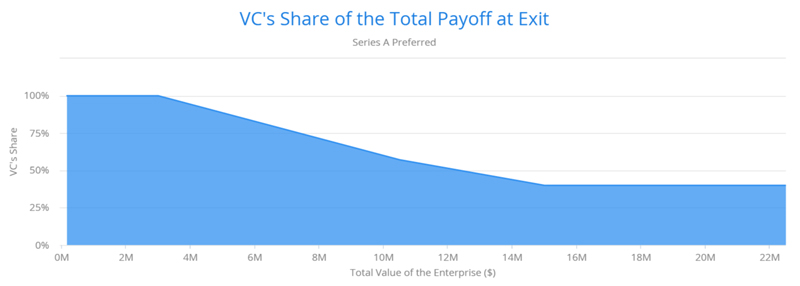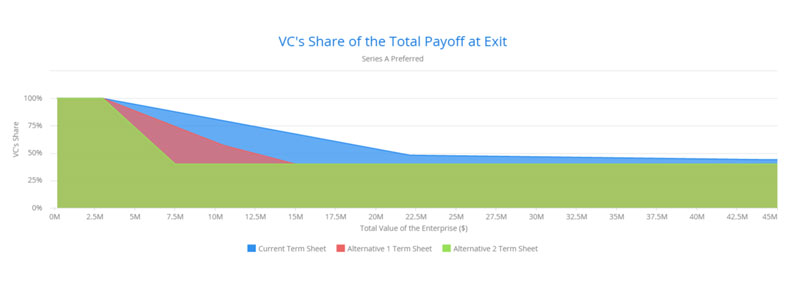vcAdviser is an analytical tool for entrepreneurs seeking angel or venture capital financing, finance & entrepreneurship students, angel investors, startup lawyers, and VC investors. The tool leverages advanced math to provide easy to grasp quantitative analysis of angel and venture capital investment deals (US patent granted). It enables greater understanding of how the value that investors and the founders derive from the deal is impacted by various contractual terms of the angel and venture capital investment.
Term Sheet Analysis
The conditions for the investment in a startup are initially outlined by the provisions in the term sheet document that is a non-binding agreement subject to negotiations between the investors and the founders. A significant portion of the term sheet describes economics of the deal through terms pertaining to company valuation, liquidation preference, participation rights, conversion rights, dividends, option pool, anti-dilution etc. Successful negotiation should lead to a final agreement that is a win-win for both the investors and founders. A win-win agreement is most likely if all parties, including less experienced founders and angel investors, have a very good understanding how different terms affect them.
Payoffs
Traditionally the economic terms of the deal are assessed by analyzing the payoff exit diagrams that describe how the proceeds from a future liquidity event, such as company buyout, IPO or bankruptcy, will be divided between shareholders, including investors and founders. Due to the use of preferred stocks in startup financing, the investors, and thus also other shareholders, do not get a fixed percentage of the proceeds. Instead, the investor’s percentage share of the proceeds is a function of the total proceeds – the percentage ranges widely from 100% to a much lower number depending on the total proceeds and the terms of the agreements. The challenge is that it is not always easy to tell which payoff diagram, and thus which term sheet, is better because for certain proceed amounts the payoffs may be greater for one term sheet while for other proceed amounts the payoffs are greater for the alternative term sheet.
Present Value
The above identified limitations are one of the reasons why the vcAdviser deal analysis goes beyond the traditional consideration of payoffs. vcAdviser also distinctively leverages financial derivatives valuation methods to estimate the present value of the investments prescribed by the term sheets. The term sheet alternative with greater present value of the investment is more economically favorable to the investor, and vice versa, the term sheet alternative with lesser present value of the investment is more economically favorable to the founders.
The Tool
vcAdviser users enter the terms of the term sheet and estimates/assumptions of the startup growth rate. The tool generates the payoff tables and charts describing how investors will divide proceeds from future liquidity events, such as company sale, IPO, or bankruptcy. In addition, the tool estimates the present value of the angel/VC investor's share in the company, indicating what portion of the post-money valuation is claimed by the investor. Lastly, the tool enables sensitivity analysis determining which term sheet clauses have the highest impact on how the startup value is divided among the investors and the founders.
$ Payoffs
How much will investors be paid at exit?

% Payoffs
How will the total payoff be divided among investors?

What-If
What difference do the VC terms make?

Sharing
How much of the present value of the startup (post-money valuation) is assigned to VC investors?

